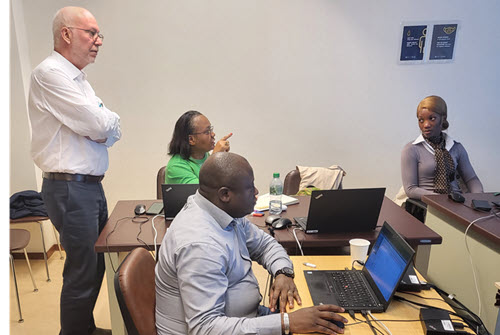Version française - Versión española
 A unique activity was organized on the Debt-DQA Methodology between 12 and 21 April 2023 in Geneva with five experienced staff from Gabon and three DMFAS experts. The objective of this workshop was to introduce the participants to the Debt-DQA methodology and validate the requirements for the future functionality in DMFAS 7.
A unique activity was organized on the Debt-DQA Methodology between 12 and 21 April 2023 in Geneva with five experienced staff from Gabon and three DMFAS experts. The objective of this workshop was to introduce the participants to the Debt-DQA methodology and validate the requirements for the future functionality in DMFAS 7.
The Debt-DQA methodology, launched in 2019 jointly with the Commonwealth Secretariat, is a framework for validating the debt database and assessing the quality of recorded data. It regroups errors and inconsistencies into specific sets of indicators that are expressed in percentage points. These indicators are then aggregated and measured against specific default tolerance levels which can be personalized.
The score sheet resulting from the Debt-DQA describes the health of data base in the three main areas of validation, that is completeness, exactitude and coherence. Once countries generate the scores, they analyze the results and draw a specific plan of action to address the problems detected, review procedural gaps, or complement with IT solutions.
The Debt-DQA methodology is already applicable to any debt database and will be automated in DMFAS 7. (see client area)
The Debt-DQA methodology strengthens the DMFAS data validation module which provides users with 17 ready-made queries to identify errors and inconsistencies in the system. Currently, each country conducts data validation on their own terms according to local needs and work calendar which means that the results cannot be compared over time nor compared against best debt management practices. The Debt-DQA and its future application 7 in DMFAS will allow for a standardization of quality assessment of national databases.
Before delving into the details of the Debt-DQA, participants reviewed all the DMFAS 6 advanced reporting and validation functionalities to give them more confidence applying the methodology which requires the standard validation module reports to be complemented by more sophisticated validation queries.
 The group then implemented the Debt-DQA methodology in a training database specially designed for this exercise and calculated the scores using a series of spreadsheets. Then participants applied the methodology to a copy of the much larger and complex Gabonese database to mimic a real environment. The scores obtained were compared to the proposed tolerance levels and/or international recommendations, uncovering very interesting outcomes some unanticipated by the participants, for example, smaller errors that had significant impact in dollar value.
The group then implemented the Debt-DQA methodology in a training database specially designed for this exercise and calculated the scores using a series of spreadsheets. Then participants applied the methodology to a copy of the much larger and complex Gabonese database to mimic a real environment. The scores obtained were compared to the proposed tolerance levels and/or international recommendations, uncovering very interesting outcomes some unanticipated by the participants, for example, smaller errors that had significant impact in dollar value.
In addition, the findings of the workshop will be incorporated to refine the requirements of the Debt-DQA functionality in DMFAS 7.
The more experienced debt managers within the debt office will be key in effectively benefiting from the Debt-DQA in interpreting results and proposing remedial actions. The DMFAS Programme can also support countries through dedicated technical assistance activities.
At the end of the activity, the Gabonese experts expressed their appreciation for this valuable training as they not only improved their skills in data validation, but most importantly, were able to identify Gabon’s debt data base issues that require adjustments. As for the DMFAS Programme, it very much appreciated this collaboration with Gabon. The exercise enabled UNCTAD to confirm the benefits of the methodology for countries, and to highlight challenges and adjustments before its integration into DMFAS 7.
